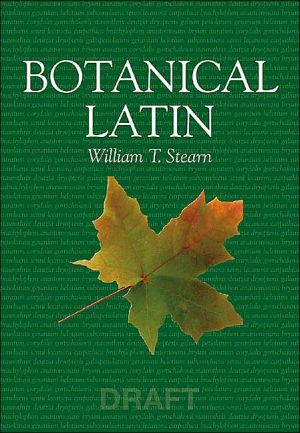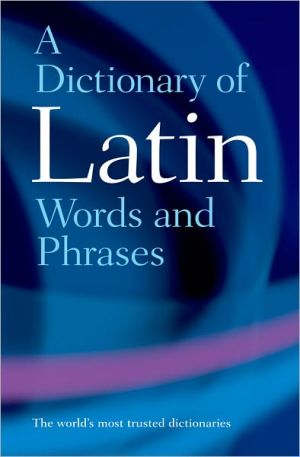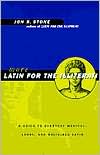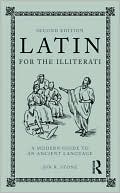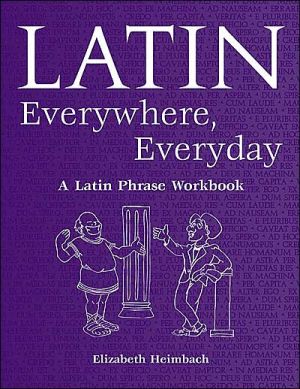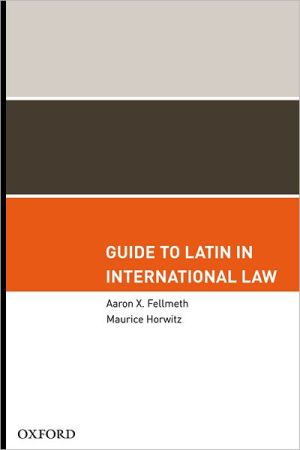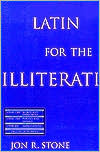Botanical Latin
Botanical Latin is accepted by horticulturists and botanists everywhere as the medium for naming new plants, and botanical research is almost impossible without reference to the vast number of first descriptions in Latin — much information is available in no other language. For gardeners, too, a working knowledge of botanical Latin is essential for the accurate identification of plants in the garden. Now available in paperback, the fourth edition of this internationally renowned handbook...
Search in google:
A classic primer for learning grammar, syntax, punctuation, and vocabulary, as well as fascinating information on Latinate geographical names and color terms. Patti Hagan - Wall Street Journal "Mr. Stearn delivers the History, Grammar, Syntax, Terminology and Vocabulary of botanical Latin with such lively erudition I often find myself foraging through this linguistic hortus botanicus for the pure word-empowering romance of it."—Patti Hagan, Wall Street Journal, September 1, 1999
\ Since a major function of verbs is to express action and since botanical descriptions usually state the characters of plants as observed in the most inactive of all states, i.e. as dead specimens fastened to sheets of paper or mounted on microscope slides, verbs have become almost redundant in modern botanical Latin. Botanists manage verbs best by avoiding them altogether. Their main use now is in diagnostic notes. But earlier authors naturally used them freely; and to read a Latin dissertation or, for example, the extensive phycological discussions in Latin of J. G. Agardh's Till Algernes Systematik (1872–90) requires almost as extensive and sound a knowledge of classical Latin as a piece of Augustan prose. This is outside the scope of the present book. For a full treatment of verbs, reference must be made to standard Latin grammars.\ For botanical purposes much of the information given in these is unneccessary. It is, however, necessary to distinguish Person, Number, Voice and Tense, which limit the application of the verb, and the parts, such as Infinitive, Participles and Gerundive, which have no limit of persons or number. The Third Person, e.g. est (it is), sunt (they are), is commonly used, the First Person, e.g. sum (I am), habemus (we have), occasionally used, the Second Person, e.g. es (thou art), estis (you are), very rarely and then mostly in dedications and prefaces. The First Person singular in the active voice usually ends in -m or -o, the Third Person singular in -t, the First Person plural in -mus, and the Third Person plural in -nt but in the passive voice the Third Person singular ends in -tur and the Thirs Person plural ends in -ntur. The pronouns ego (I), nos (we), is (he), ea (she), id (it) are rarely used, since the ending of the verb itself indicates both person and number. The Tenses commonly used are the Present and Perfect of the Indicative, e.g. differt (it differs), floret (it flowers), video (I see), vidi (I have seen or I saw), vidit (he has seen), vidimus (we have seen), viderunt (they have seen), distinguitur (it is distinguished), coluntur (they are cultivated). Being essentially adjectival in function, the Present Participle, e.g. purpurascens (becoming purple), radicans (rooting), repens (creeping), the Past Participle Passive (Perfect Participle), e.g. laevigatus (made smooth), lectus (collected), missus (sent), and the Gerundive, e.g. cognoscendus (to be known), distinguendus (to be distinguished), are much more important; they are treated as adjectives. The Perfect Indicative of the Passive is formed from the Past Participle plus the Present Indicative Active of the verb sum, e.g. visus sum (I have been seen), visus est (he has been seen), visi sumus (we have been seen), visi sunt (they have been seen).\ The Gerund is a verbal substantive ending in -ndum, with no plural but declined through the singular like other neuters in -um, e.g. ad regnandum natus (born to rule), regnandi studium (the desire of ruling).\ The Gerundive is a verbal adjective in -ndus and as such is used in agreement with substantives and pronouns.\ Active verbs have two participles; e.g. dicens (present), dicturus (future).\ Passive verbs have one; e.g. dictus (past).\ Deponent verbs have three; e.g. sequens (present), secutus (past), secuturus (future).
\ Wall Street Journal"Mr. Stearn delivers the History, Grammar, Syntax, Terminology and Vocabulary of botanical Latin with such lively erudition I often find myself foraging through this linguistic hortus botanicus for the pure word-empowering romance of it."—Patti Hagan, Wall Street Journal, September 1, 1999\ — Patti Hagan\ \ \ \ \ SpringerWienNewYork"The interesting array of words ... will pique the curiosity of even the most casual of readers leafing through the book to slow down, pause, and browse awhile."—Carole T. Gee, SpringerWienNewYork, 2006\ — Carole T. Gee\ \ \ Kalmiopsis"This internationally renowned masterpiece is indispensible."—Cindy Roché, Kalmiopsis, August 2005\ — Cindy Roch\ \ \ \ \ Wall Street Journal\ - Patti Hagan\ "Mr. Stearn delivers the History, Grammar, Syntax, Terminology and Vocabulary of botanical Latin with such lively erudition I often find myself foraging through this linguistic hortus botanicus for the pure word-empowering romance of it."—Patti Hagan, Wall Street Journal, September 1, 1999\ \ \ \ \ SpringerWienNewYork\ - Carole T. Gee\ "The interesting array of words ... will pique the curiosity of even the most casual of readers leafing through the book to slow down, pause, and browse awhile."—Carole T. Gee, SpringerWienNewYork, 2006\ \ \ \ \ Kalmiopsis\ - Cindy Roch\ "This internationally renowned masterpiece is indispensible."—Cindy Roché, Kalmiopsis, August 2005\ \
